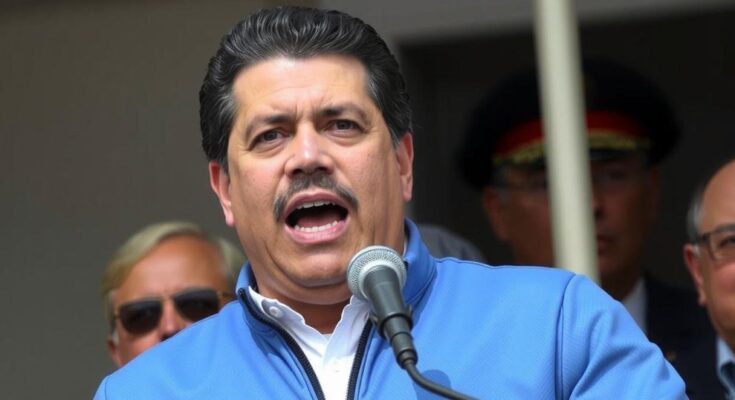Nicolás Maduro was sworn in for a third term as Venezuela’s president despite significant national and international backlash over allegations of election fraud. His inaugural address was met with protests from many nations, including traditional allies, highlighting a growing concern over democracy in Venezuela. Opposition figures remain defiant in their resistance against Maduro’s regime, which is viewed as increasingly authoritarian and illegitimate.
Nicolás Maduro has been inaugurated for a third term as Venezuela’s president amidst widespread denunciations both domestically and internationally regarding alleged electoral fraud during last year’s election. During his ceremony, which was sparsely attended due to boycotts from numerous democratic nations, Maduro asserted this was a significant victory for Venezuelan democracy. However, substantial evidence from opposition parties contradicts his claims, alleging that Edmundo González, his main electoral rival, had received the majority support as public dissatisfaction grows over Venezuela’s dire economic situation.
Maduro’s continued rule has been facilitated by the backing of military and security forces, despite his longstanding failure to produce credible evidence of his electoral win. His inaugural remarks included a lengthy diatribe against his opponents, whom he chastised as fascistic and corrupt, while presenting himself as a champion of the people. Notably, regional leaders who traditionally aligned with Maduro, such as Brazil’s Lula and Colombia’s Petro, openly protested the ceremony, indicating a rift among once-close allies.
The event drew a fresh wave of international condemnation, even from some figures on the political left, asserting that Maduro’s governance represents a dictatorship. U.S. Secretary of State Antony Blinken emphasized that the electoral process was marred, stating that the world recognizes Maduro’s loss. Meanwhile, the United Kingdom’s Foreign Secretary David Lammy reinforced this sentiment by denouncing the regime’s legitimacy and announcing further sanctions.
Responses from opposition leaders articulated their determination to resist Maduro’s regime through peaceful means, despite heightened repression leading to their exile or imprisonment. Prominent opposition figure Juan Pablo Guanipa expressed the people’s resolve to reclaim their sovereignty and reinforced their commitment to fight against tyranny. Overall, Maduro’s inauguration exemplifies the ongoing turmoil within Venezuela, marked by claims of undemocratic practices and intensified calls for restoration of true democracy.
Venezuela has faced significant political turmoil since Nicolás Maduro took office following his election in 2013. His presidency is characterized by increasing authoritarianism, economic collapse, and widespread allegations of electoral fraud. In the recent election held on July 28, 2024, opposition candidates and observers claimed that the electoral process was marked by unfair practices, leading to public outcry. The international community remains divided on Maduro’s legitimacy, with some regional allies still supporting him while others express solidarity with the opposition. This context sets the stage for Maduro’s recent inauguration, which has sparked additional protests and condemnations.
In conclusion, Nicolás Maduro’s swearing-in for a third term as Venezuela’s president has reignited debates over his legitimacy amid global condemnation of alleged electoral malpractice. The political landscape in Venezuela remains fraught with division, as opposition leaders vow to continue their struggle for democracy while facing severe repression. The international community, particularly various Western nations, continues to denounce Maduro’s regime and call for democratic reforms in Venezuela, reflecting a critical moment in the nation’s ongoing crisis.
Original Source: www.theguardian.com




